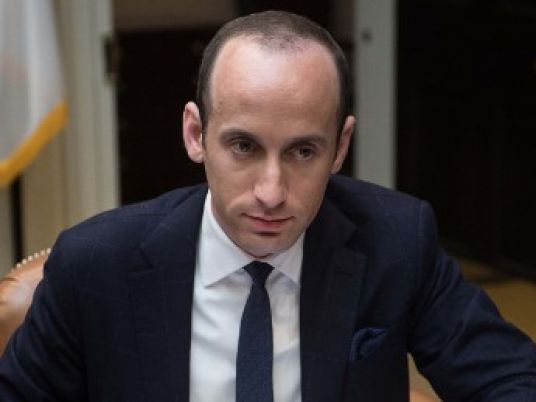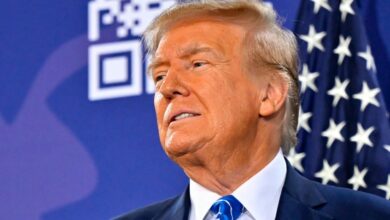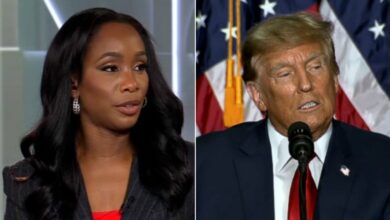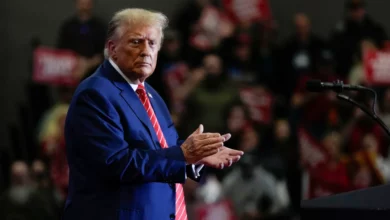
Stephen Miller, President Donald Trump's speechwriter, confidante and the author of his controversial immigration ban, has operated on the fringes of his own political party since he was a teenager.
But after what appears to have been a momentous White House policy coming out week, featuring Miller at its center, that's no longer the case. The California native has brought his views on immigration, multiculturalism and political correctness to the President's desk.
He's also helped Trump in his mission to disrupt Washington, ruffling feathers with the secretive way in which he helped lead the White House release of its temporary immigration ban from seven Muslim-majority countries late on Friday with little to no input from the government agencies tasked with implementing the vision.
But rather than a slap-dash effort, which is how the executive action seemed to unfold, Miller actually spent months crafting the order, a White House official said.
The 31-year-old White House policy director has worked as the key voice in Trump's ear on immigration, along with Steve Bannon, the former Breitbart CEO who is another top adviser. The pair at one point overruled the Department of Homeland Security's more narrow reading of Trump's executive order by directing federal officials to also bar green card holders from one of those seven countries from entering the US. Those legal US permanent residents will now need to apply for a waiver to leave and return to the US, for at least the next 90 days.
The decision to work on the order largely in secret, however, left many Capitol Hill Republicans "pretty pissed about how this went down," one aide who blamed Miller told CNN Sunday.
The secrecy also led to mass confusion over the weekend, as Department of Homeland Security and other officials struggled to parse how to carry out the order.
Defending the policy Monday, Miller told CBS the move would "make sure that people entering our country truly love and support the United States of America."
But thousands of Americans hold a different view about the temporary immigration ban on seven Muslim-majority countries, evidenced by widespread protests.
The order, however, is perfectly in line with what Miller has been writing, pushing and talking about since he was 16 years old.
Trump fires acting AG after she declines to defend travel ban.
Unlike some in the President's orbit who arrived later to the campaign, Miller has been with Trump since January 2016 and served as his hype man for much of the primary and general election.
The sharply dressed aide would often take the stage before Trump, firing up thousands of people with a consistent message: Those in power want to keep you down, but Donald Trump is here to raise you up.
"Everybody who stands against Donald Trump are the people who've been running this country into the ground," Miller said at one campaign rally in Texas. "Everything that is wrong with this country today, the people opposing Donald J. Trump are responsible for."
That rhetoric was familiar for Miller.
According to people who went to Santa Monica High School with Miller, the Trump aide made a name for himself touting his conservative views with the predominantly left-leaning student body.
"Stephen's whole view of immigration stems from high school," said Adrian Karima, a 31-year-old lawyer who sat two desks away from Miller in AP Government. "His negative views of immigration started in high school and just grew over time."
Karima, an Iranian immigrant who voted for Hillary Clinton, said Miller was outspoken in the government class, regularly challenging the teacher and arguing that the entire school — which he said had sizeable African-American and Hispanic populations — was trying to indoctrinate students.
"He saw it as being outnumbered in Santa Monica," Karima said, and viewed his role as "trying to preserve any idea of Americanism that he felt, particularly by pushing English-speaking first."
In March 2002, Miller, at age 16, wrote a lengthy opinion editorial for the Santa Monica Lookout that argued "very few, if any, Hispanic students" make it to honors classes because the school provides a "crutch" to those who don't speak English by ensuring "all announcements are written in both Spanish and English."
He also wrote that his high school wasn't patriotic enough.
"Osama Bin Laden would feel very welcome at Santa Monica High School," Miller wrote, knocking the school newspaper for condemning the military response to the terrorist attack of September 11, 2001, and faulting school administration for being "quick to preach non-violence."
Miller and other White House officials declined to be interviewed for this piece.
After high school, Miller attended Duke University, where he again became an outspoken conservative voice.
Writing for the Duke Chronicle, Miller, who is Jewish, wrote about the war on Christmas ("Christmas is being banned"), on immigration ("We oppose common-sense security measures. We give driver's licenses to illegal aliens") and on multiculturalism ("As we obsess over, adulate and extol the non-American cultures we ignore the culture we all hold in common").
After college, Miller moved north to Washington, where he began to put the political views he espoused for years into practice. His first job was with then-Rep. Michele Bachmann, the outsider Minnesota congresswoman who told CNN she took a "gamble" on Miller, who had no experience before he was hired to be her press secretary.
"I decided I would take a chance on him because he struck me as a very serious individual," Bachmann said, calling Miller "intelligent, hard working and highly competent."
One thing Miller wasn't, Bachmann said, was a free-lancer. The former congresswoman said Miller was "very circumspect not to overstep any boundaries" even though the Bachmann felt he had "insight beyond his years."
Miller would later work as Rep. John Shadegg's communications director and then tied his success to Sen. Jeff Sessions, the Alabama immigration hard-liner who is now Trump's pick to lead the Justice Department. Miller first worked with Sessions at the Senate Judiciary Committee and later moved to his personal office to serve as his communications director.
It was with Sessions where Miller came to be known as a skilled operator and true believer in conservative immigration policy. Miller helped his boss become the most outspoken critic of the 2013 bipartisan Gang of Eight immigration reform bill, penning a handbook filled with talking points on the issue and helping him lead the charge behind the scene to kill the measure.
Though the Senate passed the bill 68-32 in 2013, it died in the House and became a political albatross for the Republicans who worked to usher it through.
"He was relentless, he was constantly putting out new information and that kind of energy and determination when you are David and the other side is not just Goliath, but 100 Goliaths," Mark Krikorian, executive director of the Center for Immigration Studies, said Monday.
Krikorian, whose conservative organization advocates for more efforts to restrict legal immigration into the United States, said Miller's role was "essential" to the Alabama senator.
Sessions eventually became the first sitting senator to endorse Trump, sporting a Make America Great Again hat at a February 2015 rally in Madison, Alabama.
The joining of Trump and Sessions — two immigration hardliners — cemented Miller's career, and set him on a path to the West Wing and a key position at the arm of Trump.
But in the eyes of some Republicans, Miller isn't ready for this role.
"Why did Stephen Miller fight so hard to put out this order on Friday without talking to any of the other agencies?" Joe Scarborough, former Republican congressman and MSNBC host, said on Monday. "You've got a very young person in the White House on a power trip thinking that you can just write executive orders and tell all of your Cabinet agencies to go to hell."
For those who knew him years ago, Miller is who he always was.
"I see him on TV today and hear about him," Karimi said, "and think he was exactly the same back then."




